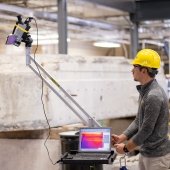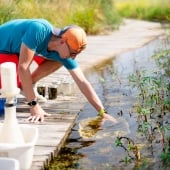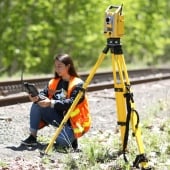Michigan Tech is a leading education and research institution, located in the beautiful Upper Peninsula of Michigan and close to the largest natural freshwater lake in North America—Lake Superior. The Department of Civil, Environmental, and Geospatial Engineering is home to four degree programs that will enable you to envision, design, and build a stronger, more sustainable world.
Request Information
Form loading . . .
Civil engineers create sustainable solutions to deteriorating infrastructure, traffic congestion, society’s energy needs, pollution, urban redevelopment, community planning, and risks posed by natural hazards such as floods and earthquakes. Environmental engineers play a critical role in making the world a better place and use their education to identify and address environmental issues at the local, national, and global levels. Construction managers build the world around us, from industrial buildings and roads to homes and hospitals. Geospatial engineers measure the world we live in. They verify and establish land boundaries and are key players in the design and layout of infrastructure, including roads, bridges, and cell phone towers.
Begin your future at Michigan Tech—it is the sustainable choice.
Bachelor's Degrees

Civil Engineering
Tackle the engineering challenges of our society head-on with a bachelor's degree in civil engineering. Civil engineers are the people's engineers. These professionals are responsible for planning, designing, building, and managing sustainable civil structures including roads, buildings, airports, tunnels, dams, bridges, water supplies, and sewage systems—addressing the modern needs of a growing global population. Earn a bachelor's in civil engineering from Michigan Tech.

Ecological Engineering
Develop sustainable systems that integrate human society into its natural environment to the mutual benefit of both. Ecological engineers are the ecosystem’s engineers. You’ll utilize expertise in engineering, ecology, and environmental science to restore ecosystems that have been disturbed by human activities and design new ecosystems that value both people and their environment. Earn a bachelor’s degree in ecological engineering from Michigan Tech.

Environmental Engineering
The environmental engineering program at Michigan Tech teaches you how to be a steward for our planet. Environmental engineers are the earth's engineer. You'll apply your knowledge of chemistry, biology, math, and physics to protect the environment and human health. As a professional you'll be tasked with developing sustainable solutions for an expanding global community. Earn a bachelor's in environment engineering from Michigan Tech.

Geospatial Engineering
Geospatial engineers are experts in measurement and management of data. At Michigan Tech we offer the right blend of instruction, including plenty of hands-on experiences. You'll be ready to do the job from day one—and able to pursue professional licensure in all 50 states. Earn a bachelor's in geospatial engineering from Michigan Tech.

Construction Management
A bachelor's in construction management from Michigan Tech prepares you to plan, budget, and supervise any building or commercial construction project from start to finish. Learn the basics of surveying, utility systems, construction, and materials. That includes the business and communication skills critical to completing projects on time and under budget. Incorporate sustainable building practices to meet client needs and help conserve resources.
Engineering Design and Research
At Michigan Tech your inner entrepreneur can thrive as part of our unique Enterprise Program. Join an Enterprise team to work on real projects, with real clients. Choose from 20+ teams on campus to invent products, provide services, and pioneer solutions, such as Built World Enterprise, Green Campus Enterprise, and Alternative Energy Enterprise.
It takes teamwork to bring creative ideas to life. During your senior year, you’ll have the chance to work with fellow students students on a senior design project. Immerse yourself in a challenging project with an open-ended design solution. Your small team will be taught by faculty, alumni, and industry partners who have years of consulting and industry experience. International Senior Design (iDesign) allows you to apply your engineering knowledge to solve real-world problems abroad.
You can even try your hand at research, working side by side with faculty mentors on funded projects as early as sophomore year. Research in the CEGE Department spans a vast range of expertise including sustainable materials in transportation, accurately estimating Great Lake water level increases, making risk informed decisions for coastal railroad systems subjected to storm hazards and sea level rise, understanding the fate and transport of PFAS in water systems, and more.



